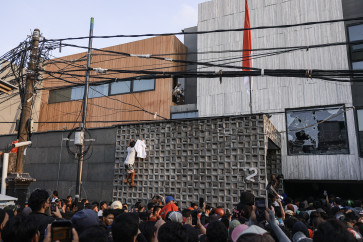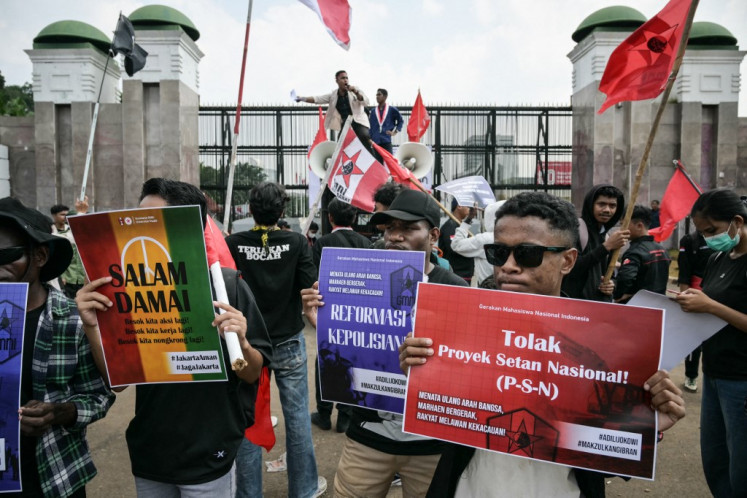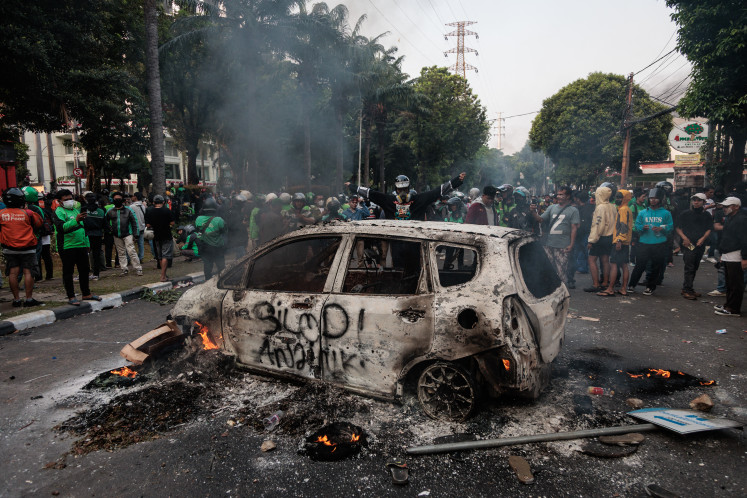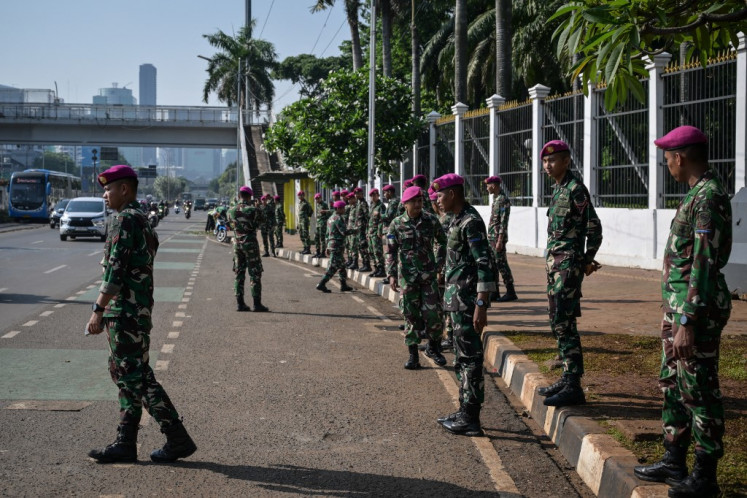Popular Reads
Top Results
Can't find what you're looking for?
View all search resultsPopular Reads
Top Results
Can't find what you're looking for?
View all search resultsLatest score in the coalition political match: SBY 1 - Ical 1
President Susilo Bambang Yudhoyono (SBY) won the latest running open battle with Aburizal Bakrie (Ical), the business tycoon and chairman of the Golkar Party, which is a member of Yudhoyono’s coalition government — but barely
Change text size
Gift Premium Articles
to Anyone
P
resident Susilo Bambang Yudhoyono (SBY) won the latest running open battle with Aburizal Bakrie (Ical), the business tycoon and chairman of the Golkar Party, which is a member of Yudhoyono’s coalition government — but barely. The score between the two men, as it stands today, is one apiece. The war is far from over, so expect a few more battles like this in the lead up to the 2014 presidential election.
On Tuesday last week, Yudhoyono outmaneuvered Aburizal to defeat a motion initiated by Golkar and another member of the coalition government, the Prosperous Justice Party (PKS), in the House of Representatives. The motion, which called for an inquiry into allegations of collusive practices between tax officers and well-connected people, was defeated, with 264 “yes” votes and 266 “no” votes.
In the vote, Golkar and PKS were joined by the Indonesian Democratic Party of Struggle (PDI-P) and the People’s Conscience Party (Hanura), officially the opposition parties in the House. Yudhoyono’s Democratic Party counted on the support of three other coalition partners — the National Mandate Party (PAN), the National Awakening Party (PKB) and the United Development Party (PPP) — and one party from the opposition camp, the Great Indonesia Movement Party (Gerindra).
To the casual observer, what was so galling about this affair is that this is a battle that pit members of the coalition government against each other, with the opposition parties playing a mere supporting role. On a more personal level, this is really a battle between Yudhoyono and Aburizal. We will soon know about the fate of the coalition government following the latest backstabbing by Golkar.
The President is now coming under a lot of pressure from within his own party to expel the coalition partners that had broken ranks. He came under a similar pressure last year when he lost the first battle with Aburizal, but rather than expelling or punishing for the betrayal, Aburizal was awarded the chair of the newly established joint secretariat of the coalition partners.
In January 2010, Golkar and PKS, in collaboration with PDI-P and other smaller opposition parties, forced a House inquiry into the 2008 bailout process of Bank Century, a small-sized bank whose depositors included major donors in the 2009 election campaign. The inquiry led to a House resolution that faulted the government for approving the expensive bailout.
Yudhoyono’s Democrats lost the vote in the House, and the result forced former finance minister Sri Mulyani Indrawati, deemed most responsible for the bailout decision, to resign.
The ensuing legal investigation, however, found nothing incriminating in the bailout process. Still, the defeat affected not only the credibility of the President, but he also lost the most reform-minded minister in the Cabinet. Sri Mulyani has since joined the World Bank as managing director.
So what was Yudhoyono thinking? Why did he decide not to punish Aburizal at that time, and instead even rewarded him with a new footing in the government? Why does he need to retain Golkar at all?
Coalition government is a fact of life in Indonesia’s multiparty system, even when the constitution grants the elected President immense power to form his own government. And no one knows how to play the coalition game better than Yudhoyono, being the first directly elected president in Indonesia in 2004. He may not have fully mastered the art of managing a coalition government, but he knows how the system works, perhaps better than anyone else in the country.
Although Yudhoyono won with 62 percent of the vote in the 2009 presidential election, his party only controls 26 percent of the seats in the House. He needed to forge a coalition in order to ensure majority support for his legislative agenda. After his re-election in 2009, he brought Golkar back into the government even though the party had been the major challenger at the polls. The current government, comprising six parties, technically controls 76 percent of the House.
No one should underestimate Yudhoyono when it comes to managing the coalition. Ask Jusuf Kalla, his vice president in 2004-2009 and Golkar chairman at that time. It was a partnership that worked well, but it was one which, in the end, benefited Yudhoyono politically — at the expense of Kalla. When the two slugged it out at the polls in 2009, Golkar was demoted to a distant second to make way for Democrats, and Kalla bitterly came a poor third to Yudhoyono in the presidential election.
Now Yudhoyono’s chief nemesis is the new Golkar chairman Aburizal Bakrie, and again, in spite of the backstabbing in 2010, the President decided to retain him and Golkar within the coalition. Several overtures to PDI-P, the only other party in the House with significant number of seats to replace Golkar in the coalition, had been repeatedly rebuffed by its chair Megawati Soekarnoputri. It would not be surprising if Aburizal and Golkar, and PKS for that matter, remain in the coalition after the latest betrayal.
The bigger stake in the running battle between Yudhoyono and Aburizal is the 2014 race. While it is almost certain that Aburizal will take a crack at the election, it is still unclear who Yudhoyono plans to field for the Democratic Party. He cannot run again because the constitution limits him to a maximum of two consecutive terms, but as patron of the largest party in the country, he will still yield influence on the outcome of the 2014 race.
Whatever Yudhoyono does with the coalition government obviously will have something to do with whatever plans he has in store for 2014 and beyond. And the one plan that he has kept very closely to his chest is the nomination for the 2014 presidential candidate.
Never underestimate the man who built his career as a military strategic thinker. He is probably still the best in the country when it comes to playing the game of coalition politics. He certainly showed that in 2009.
The writer, a visiting fellow at the East West Center in Washington, is senior editor of The Jakarta Post.










